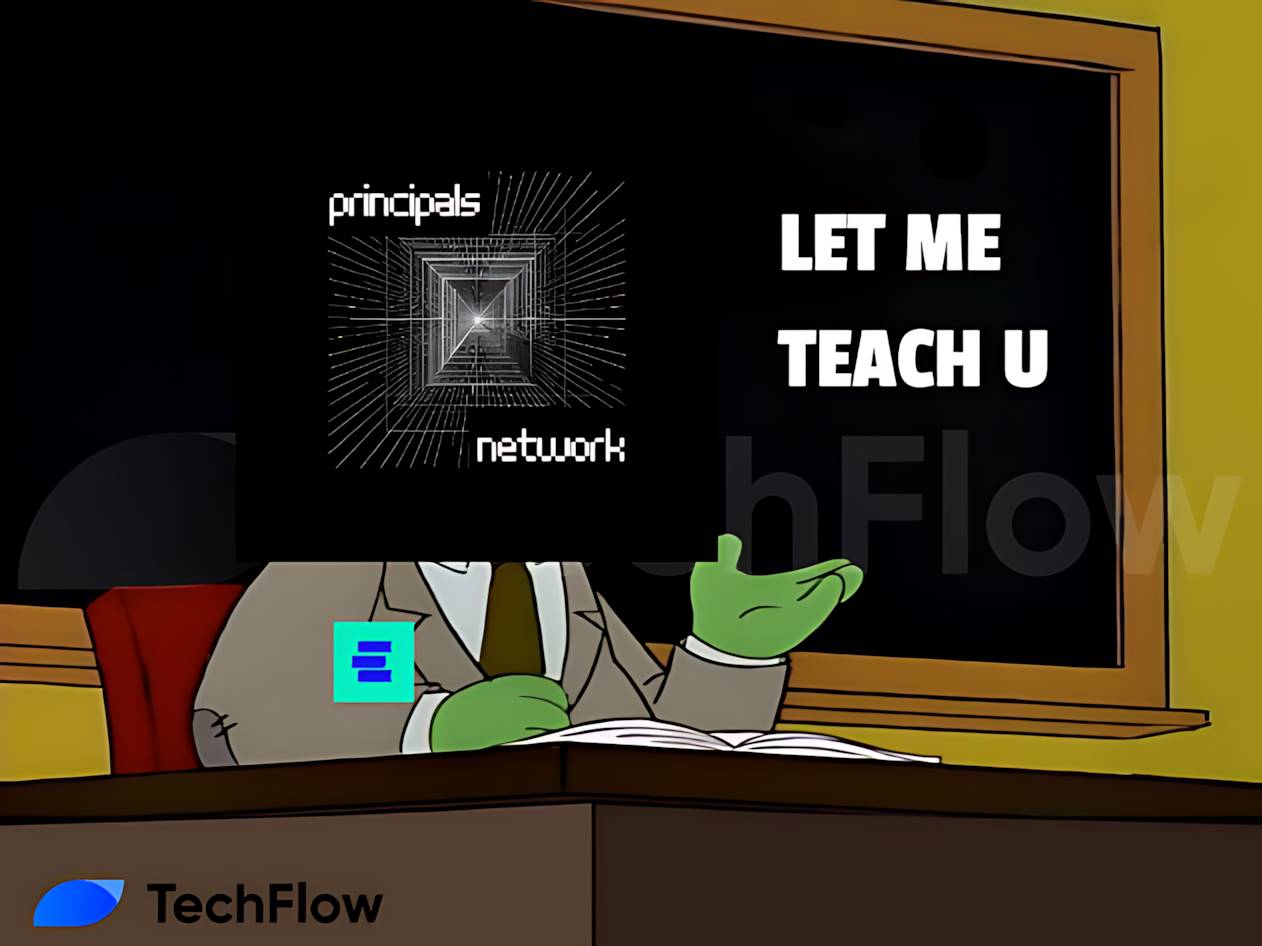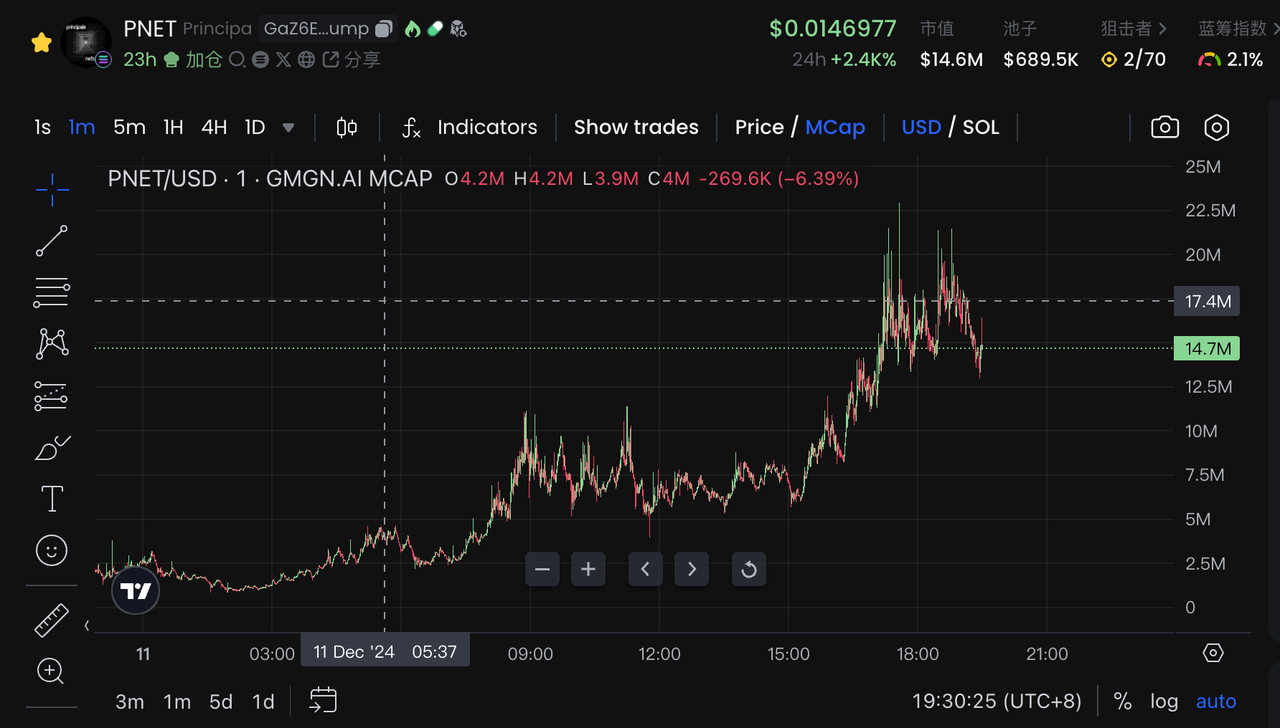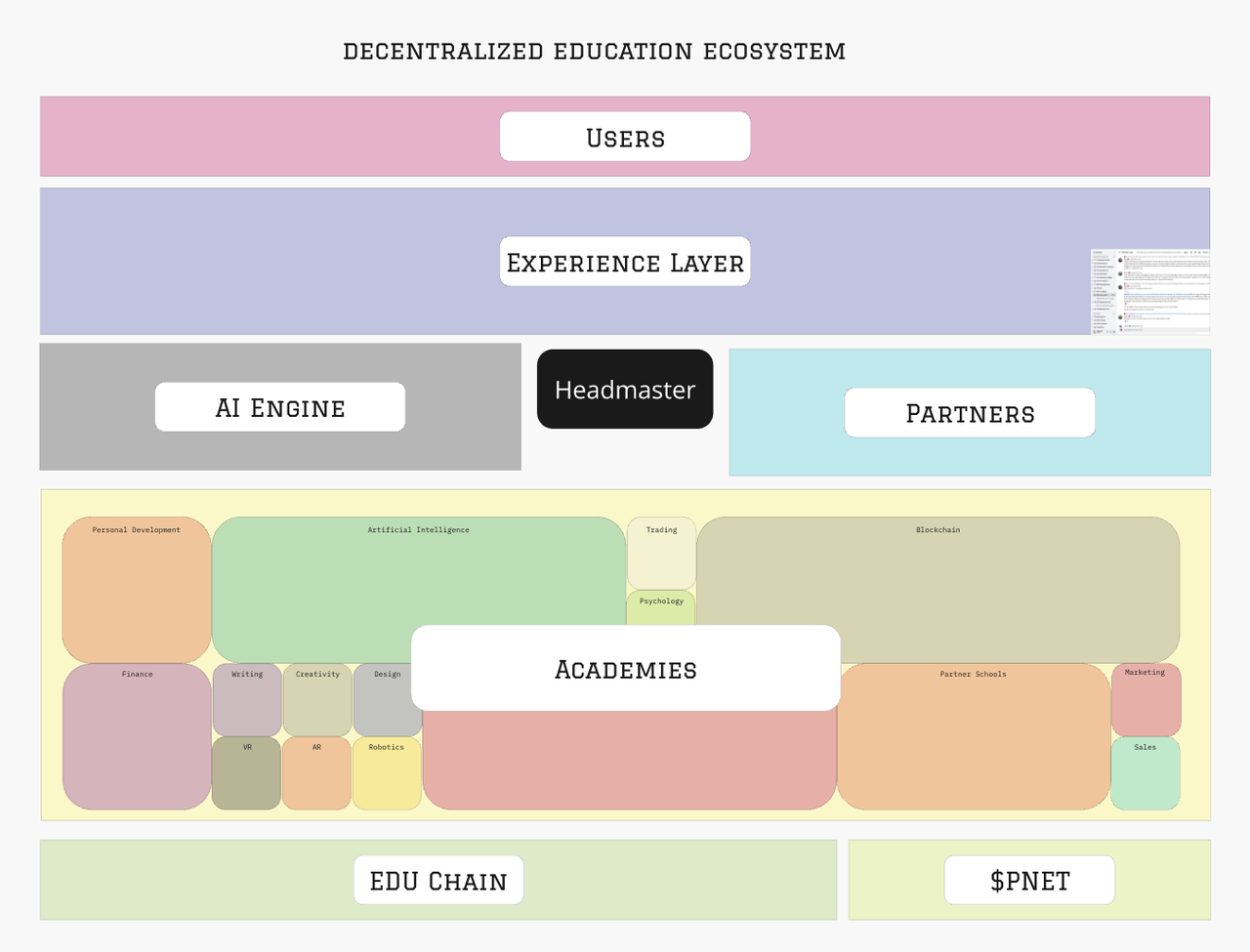Author: TechFlow
Welcome to a day of revival in the Solana ecosystem.
With Solana officially announcing the hosting of an AI hackathon, ai16z has started to rebound and surpassed GOAT in market capitalization, and capital in the market has started to flow into AI Agent-related projects.
If you look closely at the introduction of the hackathon, the goal of the event is very clear --- Build the best AI Agent products.
The official participation also means that in the coming period, the overall environment will be favorable for those AI Agents that can solve practical problems or target specific directions.
And this expectation may have already been priced in.
Today, a project called Principals Network, whose token $PNET (note that it is not PNUT squirrel) has been rising all the way up in the 24 hours since the token was issued, with its market capitalization rising from around 200k to 15M, and there are now some sporadic discussions, but it is still outside the mainstream narrative.
And the goal of this project is very clear, which is to target a specific direction: to use AI agents to build a decentralized education network.
From a narrative perspective, the first one is very important.
To make an AI agent as a personalized education assistant and private tutor, this narrative seems to be a first. In addition, the support of the AI hackathon for discovering practical projects has further boosted PNET's expectations.
We've taken a look at its design document and will share more information with you.
AI as a personalized private tutor, with on-chain learning proof
Before delving into PNET, we need to first understand the core problem it wants to solve.
Traditional online education platforms often face the contradiction between standardization and personalization: either the course content is monotonous, or the one-on-one tutoring fees are high. With AI Agents, this problem seems to have found a new solution.
AI itself can become a personalized private tutor.
The core design of PNET revolves around three key elements:
AI Teaching Agents
These are not simple question-answering machines, but specially trained domain expert AIs; each agent is focused on a specific subject area, such as blockchain, artificial intelligence, or personal development. At the same time, they are able to understand the cognitive level of the learners and develop personalized learning paths.
AI continuously optimizes its teaching strategies through ongoing interaction with learners, making the teaching itself a kind of training optimization.
This functional layer is integrated into the AI Engine layer, which is centrally orchestrated by the Headmaster module. (See the architecture diagram below)
Decentralized Knowledge Graph
This layer is built within the Academies, and is a connection of knowledge points across different subject areas. Through community contributions, it is continuously expanded and optimized, helping AI agents understand the relationships between knowledge.
This design can provide learners with multi-dimensional knowledge exploration paths, supporting cross-disciplinary learning and knowledge integration.
On-chain Learning Proof (Proof of Learning)
This function is built on top of the EDU Chain layer, recording every step of the learner's learning progress, and generating verifiable skill certificates. Most importantly, after you complete your studies, it will be combined with the $PNET token incentive mechanism, providing learners with more external reward motivation.
These three points can theoretically form a self-sustaining cycle: the AI teaching agents acquire teaching content and associated information through the knowledge graph, the learning process is recorded through on-chain proof, and feedback is given to the AI agents to optimize the teaching; the knowledge graph is then continuously enriched and validated through the learning process.
And by delving into the project's architecture, we can see that the core of PNET is a decentralized education network built on the Solana ecosystem, adopting a three-layer design: AI Principals, Academy System and EDU Chain.
The AI Principals layer is the core of the entire system, with specially trained AI Agents serving as personalized tutors. These AI Agents not only can customize learning paths based on the learner's characteristics, but also provide real-time tutoring and Q&A. The Academy System layer is responsible for managing educational content and resources, building a dynamically evolving curriculum system, and coordinating the interaction between learners and AI Principals. The bottom layer, EDU Chain, is built on Solana, mainly handling educational certificate authentication, credit management, and token incentives.
The more detailed division of labor in the above architecture can be summarized as follows:
Infrastructure Layer
EDU Chain: as the underlying blockchain infrastructure for the entire system
$PNET: the native token of the ecosystem, used for incentives and governance
Core Layer
AI Engine: responsible for the core engine of intelligent teaching
Headmaster: the central orchestration module of the system
Partners: the module for partner integration
Subject Content Layer (Academies)
This layer is particularly interesting, containing multiple professional fields, such as Personal Development, Artificial Intelligence, Trading, and Blockchain, among both in-circle and out-of-circle subject areas.
Currently, PNET has released a testnet, but we haven't actually seen the full product; the market's optimism about the project is more about pricing in expectations, but it is undeniable that this attempt to deeply integrate AI, Web3, and education represents an innovative direction for online education.
Potential Connection with Open Campus
The market capitalization of PNET has soared from 200k to 15M in just 24 hours, and in addition to the innovative narrative of AI Agent education, there is a deeper reason - its potential connection with Open Campus.
Reviewing the project's documentation, we can find that Principals Network has an ecosystem support relationship with Open Campus: the former, as a recipient of the Open Campus accelerator program, has confirmed that it will integrate the EDU Chain's SSO (single sign-on) and certification mechanism into its own platform. Behind this seemingly ordinary technical integration, there is actually a larger imagination space.
As Binance's important layout in the Web3 education field, Open Campus has already received a $3.15 million strategic investment from Binance Labs in 2023, and the market generally understood this as Binance's optimism about the Web3 education track.
Through this relationship, PNET's valuation story seems to have become more three-dimensional.
The project may no longer be just an educational innovation project that has jumped on the Solana AI hype, but may become an important node connecting the Binance ecosystem.
This superimposition of dual positive factors may explain why capital has flowed into PNET. Investors seem to have already started to buy into the background of a "Binance ecosystem Web3 education AI project".
Of course, whether this expectation can be realized still needs to be seen in the actual progress of the project going forward.
However, the best hype space for a project is still when its expectations are full but have not yet been fulfilled; of course, for Degens, the expectation is best never to be fulfilled.










